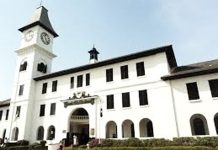The Ghana Man and the Biosphere (MAB) Committee, together with the National Development Planning Committee (NDPC), have launched a handbook for mainstreaming the biosphere reserve concept into development planning.
The handbook is to make biosphere issues a normal component in national development planning and budgeting processes with funding support from the Ghana Commission for UNESCO.
The handbook would also influence processes, policies and programmes, and make them more biosphere-friendly.
Speaking at the event, organised by the Environment Protection Agency, the District Chief Executive for Ada West, Sampson Tetteh Kpankpah, said biosphere reserves were special type of protected areas that draw attention to the connections and potential compatibility between people and nature, bridging conservation and development.
He went on to say that the biosphere reserve concept was a long term commitment to a laudable project that must be supported, not only by Districts in which the reserves are found, but all across the country.
The Director General of the NDPC, Kodjo Esseim Mensah-Abrampa, said his outfit would see to it that the handbook for mainstreaming the biosphere reserve was protected and used for its designed purpose.
He added that this initiative was an opportunity to bring the relevance of the biosphere preservation to the district and how they can make gains from it.
He stated: “Anybody who picks up the plan will be able to identify the importance of this reserve and its importance to the economy, as well as improving the lives of the people.”
According to Ama Serwah N. Tetteh, Secretary General of UNESCO, there was empirical evidence of the contribution of Biosphere Reserves to climate change, biodiversity restoration and sustainable development.
To her, the concept had, over the years, been promoting harmony among humans and the environment, as well as promoting sustainable livelihoods.
The Secretary General of UNESCO believes the application of the Biosphere Reserves concept would, not only help to restore our lost biodiversity, but help us to benefit from the ecosystems as well.
In this regard, she added that the world network of biosphere reserves currently covers more than 5% of the earth’s surface, and continues to be considered for enlistment onto the world network of biosphere reserves, which shows how governments were committed to the project.








